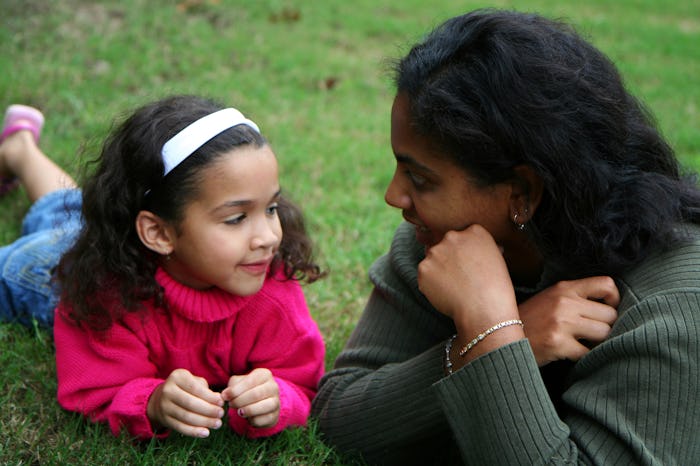Life

9 Questions To Ask Your Child That'll Make Your Relationship Better
Children can seem like open books, easily spilling all their thoughts and feelings, but that can be deceptive. Often, children don't think to share some of their most important experiences or feelings. That's why there are questions to ask your child to make your relationship better. Getting closer to your child, understanding them, and actually hearing them makes your relationship better automatically.
Like adults, some children are more introverted and some more extroverted. Not every child will be the endlessly chatty and tell you every tiny detail about their day (yes, even the stuff you don’t need to hear.) However, if the adult is trustworthy and has shown an interest in their little one's life, even the shyest child can open up. There may be long pauses as your child meanders through their thoughts, but they will often come up with surprisingly touching or unexpected answers.
But in order to get them to open up, you may have to get the conversation rolling with some questions– and not ones that elicits a yes or no response. These questions will not only open up a conversation with your little one, but they have the power to make the parent-child relationship even better.
1"What Do Love About Being A Kid?"
Their answer to this is a reflection of their experience and a question that opens up a lot of possible discussions, which equals a closer relationship. This is also a good discussion to reinforce the idea in your child's mind that the stage of life they are in isn't permanent, and the things that they find hard or infuriating about being a kid won't last forever.
2What Do You Like About Computers?
Technology plays a huge role in children's lives at home, school, and even their social lives. Finding out their thoughts on devices and social media helps to start to a conversation you will be having throughout their childhood, whether it's about boundaries, use, or creative options. This is a good way to keep a flexible conversation going about a subject that can become problematic between parents and kids.
3What Are Your Options?
This is an especially important question to ask your kids when they have to confront a challenge. In asking, you help them build skills around coping, creative problem solving, and maintaining a positive attitude. It also helps your relationship, because when you and your children face a problem (and trust me, you will), they can approach it in a problem solving manner.
4What Makes You Feel Happy?
The more you know what makes your child feel happy, the more happiness you can add to their lives. Of course, you'll probably have to ignore a few answers like "A three foot rainbow cake with ponies!"
5What Makes You Feel Sad?
Ask this question every now and then, and you'll find out a lot about your child's inner life. One day, the answer may be that you and your husband fight too much (ouch), and another, you may find out about a bully at school. Kids forget to tell their parents important things all the time, so asking is crucial. In knowing, you can help them problem solve, affirm that sad feelings are normal and OK, and cement the trust and bond between the two of you.
6What Do You Love/Not Love About Our Family?
This question can produce startling results. You may already know that your child adores Aunt Flo's horse collection, but you may not realize that she really doesn't how Uncle Henry's hugs her without asking. It's a great way to approach the weighted subject of family, and bond over shared giggles and shared emotions.
7What Is Your Favorite Part/Least Favorite Part of Today?
In our family, everyone answers this question one by one as we eat dinner. It's a great way to stay connected to your child.
8What Do You Think About When You Fall Asleep?
A lot can come up with this question, from the mundane (homework stress), to the serious (grandpa's health), to the dreamy (crushes, future life as an adult). It's another useful way to get a look inside your child's mind.
9What Can I Do To Help You?
Doesn't everyone want to be asked this? Children especially might have a hard time forming the idea that they can ask for help with certain, harder to pin down issues, but if you jog their mind by asking, they can come up with some areas where your support really matters.